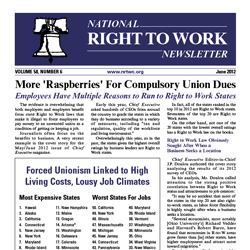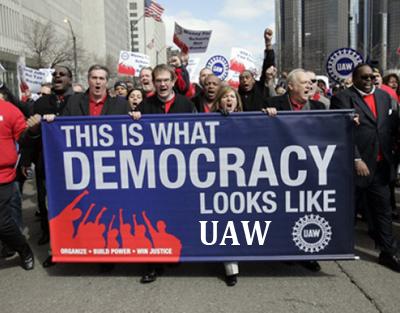Big Labor's Image Problem Continues to Grow
For one of the most powerful unions in America, the teacher’s union has a real image problem — and rightfully so. Only 22% of Americans…

For one of the most powerful unions in America, the teacher’s union has a real image problem — and rightfully so. Only 22% of Americans…

For one of the most powerful unions in America, the teacher’s union has a real image problem — and rightfully so. Only 22% of Americans…
There's freedom and religious freedom, but if either interfere with union bosses and dues collections-- well, kiss your Civil Rights goodbye. That is unless you have National Right To Work Legal Defense attorneys helping you ... From NRTW.org: Union Bosses Set Forest Fire Captain’s Religious Rights Ablaze Union officials and state play God with firefighter’s rights San Francisco, CA (May 21, 2012) – A California Department of Forestry fire captain has filed a religious discrimination charge against the California Department of Forestry Firefighters (CDFF) union for violating his statutory right to refrain from paying forced union dues to support a union hierarchy involved in activities he considers immoral. With free legal assistance from National Right to Work Foundation attorneys, Susanville firefighter John Valentich filed the charge against the CDFF union with the California Department of Fair Employment and Housing and the Equal Employment Opportunity Commission located in San Francisco.
There's freedom and religious freedom, but if either interfere with union bosses and dues collections-- well, kiss your Civil Rights goodbye. That is unless you have National Right To Work Legal Defense attorneys helping you ... From NRTW.org: Union Bosses Set Forest Fire Captain’s Religious Rights Ablaze Union officials and state play God with firefighter’s rights San Francisco, CA (May 21, 2012) – A California Department of Forestry fire captain has filed a religious discrimination charge against the California Department of Forestry Firefighters (CDFF) union for violating his statutory right to refrain from paying forced union dues to support a union hierarchy involved in activities he considers immoral. With free legal assistance from National Right to Work Foundation attorneys, Susanville firefighter John Valentich filed the charge against the CDFF union with the California Department of Fair Employment and Housing and the Equal Employment Opportunity Commission located in San Francisco.

Click here to download a copy More ‘Raspberries’ For Compulsory Union Dues — Employees Have Multiple Reasons to Run to Right to…

Liz Peeks at the Fiscal Times looks at the political and economic damage big labor has done to the once Golden State: President Obama raked in a hefty $15 million from Hollywood’s elite at George Clooney’s home last week. The $40,000 per plate star-studded crowd cheered the president’s just-in-time conversion to same-sex marriage; are they equally enthused about Mr. Obama’s economic prescriptions? Californians should know better. Their state, best known for red carpets, is awash in red ink, just like the federal government. Earlier this week, Governor Jerry Brown announced that the state’s budget deficit will approach $16 billion this year, up from $9.2 billion projected just a few months ago. Years of misguided financial policies have led to this: stifling taxes and savage cuts to public services – including Medicaid, childcare and welfare programs. Even movie stars occasionally venture out. What do they find? A state with 12 percent of the country’s population and one third of its welfare recipients. A state with the nation’s lowest bond ratings, the second-highest marginal income tax rate and the third highest unemployment rate. Most important – a state that CEOs rank the worst in the country for doing business. Dead last! For the eighth year in a row. The upshot? Businesses are leaving California. Spectrum Location Solutions reports that254 California companies moved some or all of their work and jobs out of state in 2011, an increase of 26 percent over the previous year and five times as many as in 2009. According to the Labor Department, California’s private employment actually shrank 1.4 percent over the past decade, while Texas added 1.15 million jobs.

The UAW has a formula to help their members -- spend more on politics. The current strategy will soon, according to the blog Truth About Cars, lead to another bailout -- this time solely for the union: It’s said that people do resemble their dogs. The UAW surely looks more and more like the GM of old. For years, the UAW has spent more than it took, forcing it to live off its savings. Once again, the UAW wants to change this – two years from now. Until then, it will happily go on making losses. Said Bob King to Reuters: “We are spending a lot of money, and we’re investing money in organizing. And we’re investing money in rebuilding the ability of the UAW to win good contracts and win good legislation for our membership.” King told Reuters that in two years, the UAW wants to be cash-flow positive by adding members and managing costs.
Union activists have littered a construction project in Philadelphia with bottles of urine because a new company had the audacity to hire non-union construction workers on a new development project. “We’re going to continue to embarrass the Pestronks [project owners] until they start doing the right thing for our community and our society, and that is pay fair wages and standards that have been established,” said Pat Gillespie, a boss in the Philadelphia Building and Trades Council. Of course, doing the "right thing" means filling the union's coffers.
Our readers are well aware of costly and wasteful project labor agreements that eliminate competitive bidding on construction projects to ensure that the project pays a “union wage.” Members of the House were forced to decide on whether tax dollars…